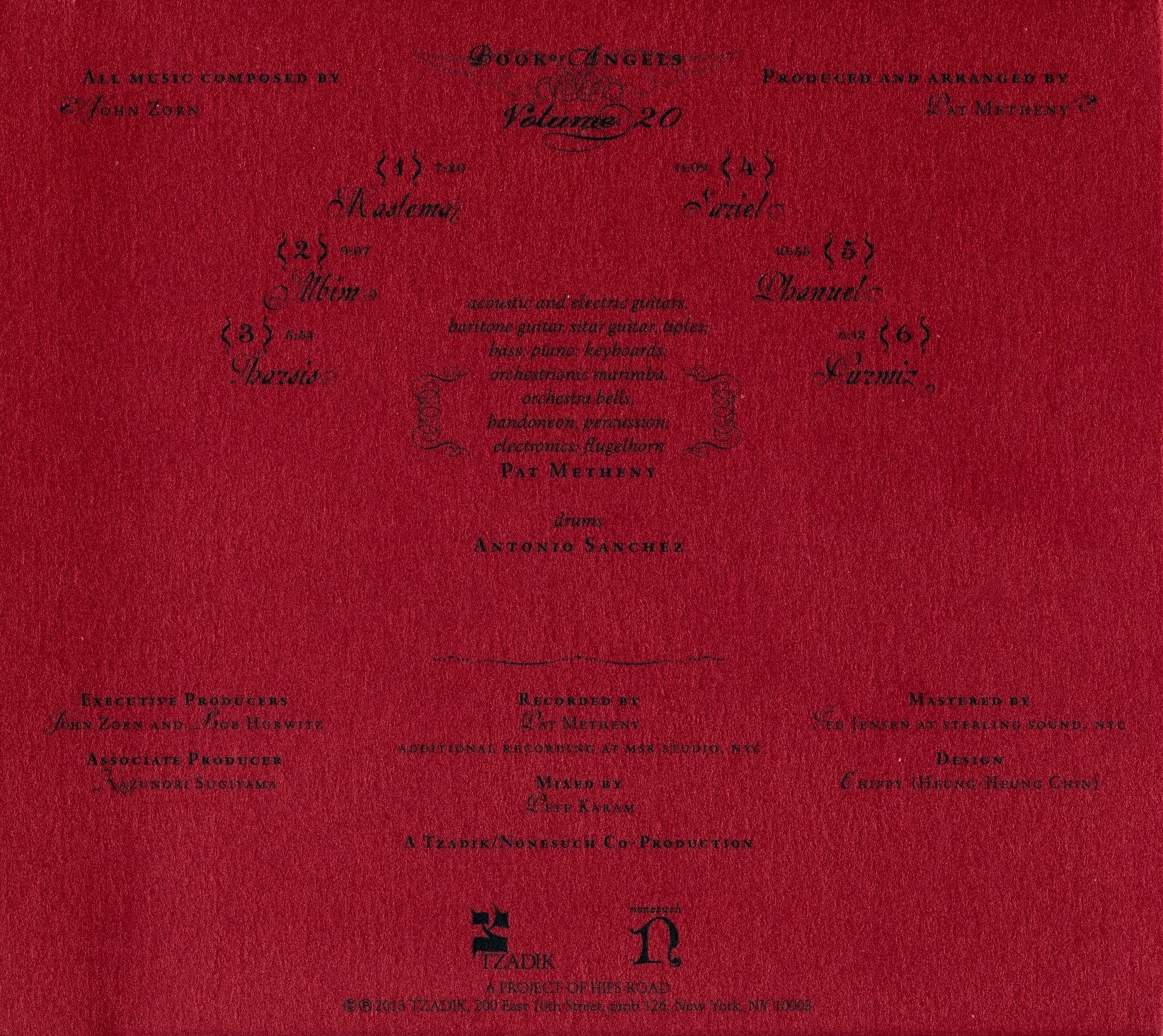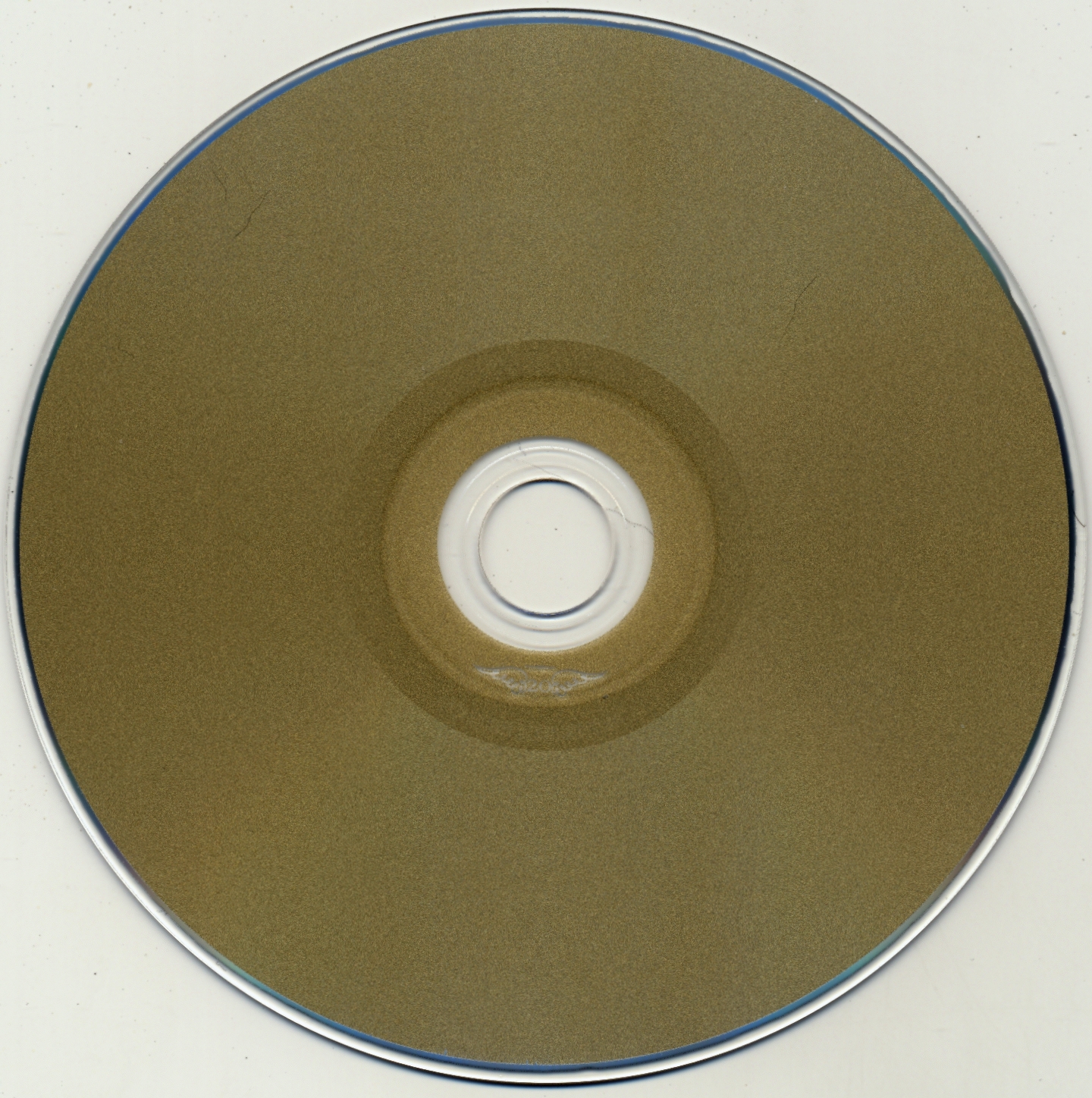


BOOKLET
———————————————————————
Pat Metheny – Tap, John Zorn’s Book of Angels, Vol. 20
———————————————————————
Artist……………: Pat Metheny
Album…………….: Tap, John Zorn’s Book of Angels, Vol. 20
Genre…………….: Jazz
Source……………: NMR
Year……………..: 2013
Ripper……………: NMR
Codec…………….: LAME 3.99
Version…………..: MPEG 1 Layer III
Quality…………..: Extreme, (avg. bitrate: 261kbps)
Channels………….: Joint Stereo / 44100 hz
Tags……………..: ID3 v1.1, ID3 v2.3
Information……….:
Ripped by…………: NMR
Posted by…………: theblah on 26/05/2013
News Server……….:
News Group(s)……..:
Included………….: NFO, LOG
Covers……………: Front Back
———————————————————————
Tracklisting
———————————————————————
1. Pat Metheny – Mastema [07:20]
2. Pat Metheny – Albim [09:07]
3. Pat Metheny – Tharsis [05:54]
4. Pat Metheny – Sariel [11:09]
5. Pat Metheny – Phanuel [10:55]
6. Pat Metheny – Hurmiz [06:12]
Playing Time………: 50:39
Total Size………..: 96.15 MB
NFO generated on…..: 26/05/2013 22:07:33
:: Generated by Music NFO Builder v1.21b – www.nfobuilder.com ::
Artist: PAT METHENY
Title: TAP: JOHN ZORN’S BOOK OF ANGELS, Vol. 20
All Music composed by John Zorn
Released: May 20, 2013
Recorded, produced and arranged by Pat Metheny
Additional recording at M&R Studio, NY
Executive Producers: John Zorn and Bob Hurwitz
Associate Producer: Kazunori Sugiyama
Mixed by Pete Karam
Mastered by Ted Jensen at Sterling Sound, NYC
Design: Heung-Heung “Chippy” Chin
Genre: jazz
Length: 50:37
Label: Tzadic (TZ8307)
***Musicians:
Pat Metheny: acoustic and electric guitars, baritone guitar, sitar guitar, tiples, bass, piano, keyboards, orchestronic marimba, orchestra bells, bandoneon, percussion, electronics, flugelhorn
Antonio Sánchez: Drums
***Commentary from http://www.patmetheny.com/:
PAT METHENY/TAP CD
Nonesuch/Tzadik to Release PAT METHENY/TAP: John Zorn’s Book of Angels Vol. 20 on May 21
Pat Metheny/Tap: John Zorn’s Book of Angels, Vol. 20Pat Metheny adds his contribution to John Zorn’s ambitiously expansive Masada Book Two with Tap: The Book of Angels, Volume 20. This album is the first collaboration between the two artists, considered among their generation’s most innovative musicians. Besides his frequent collaborator, drummer Antonio Sanchez, Metheny plays all other instruments—guitars, sitar, tiples, bass, keyboards, orchestrionics, electronics, bandoneón, percussion, flugelhorn, and more—himself.
Beginning in the 1990s, Zorn wrote 500 songs inspired by traditional Jewish music; they came to be known as two volumes of the Masada Book. He performed the first 200 songs of Book One with the rotating members of the Masada ensemble for a decade before writing Book Two’s 300 tunes in just three months. Over the past eight years, the songs from Book Two have been recorded as volumes of The Book of Angels by a stellar group of musicians, including the Masada Quintet, Masada String Trio, Medeski Martin & Wood, and Marc Ribot.
Zorn says of Metheny’s recording, “Pat is of course a living legend—one of those rare lights in the universe. His incredible facility and dedication, indefatigable energy and focus, imagination, and never-ending curiosity have distinguished him as truly one of the greatest musicians on the planet.” He continues, “Tap is a showcase for Pat’s remarkable imagination, technique, passion, and love for the world. No matter how many times I listen to this recording I am hit with that same sense of exhilaration that hit me the very first time.”
Metheny, who recently won his 20th Grammy Award, adds, “I have admired John Zorn since the late ’70s and have followed his amazing output every step of the way. A few years ago, after contacting me to write some notes for one of his Arcana publications, John and I began an inspired e-mail connection. (As hard as it is to believe, we had never met in person over the years.) I mentioned that I had followed his Book of Angels series from the start and felt like I might be able to contribute something unique to the collection. With his enthusiastic encouragement, he gave me some suggestions as to which tunes were still unrecorded, and I picked the ones that jumped out and spoke to me. Over the next year, in between breaks from the road, I recorded them one by one in my home studio whenever I got a chance.”
***Review from http://www.allmusic.com/:
by Thom Jurek
4 stars out 5
On his own recordings, Pat Metheny has always pushed his artistic envelope. Very occasionally when moving to the outside, it’s been to the chagrin of some fans. It happened with Ornette Coleman on the brilliant Song X in 1985; next was on the screaming guitar effort Zero Tolerance for Silence in 1994, and finally on his collaboration with Derek Bailey on The Sign of 4 in 1997. But while his collaboration with another true American original, the prolific composer John Zorn, is outside work for Metheny, it may not alienate longtime fans due to its relative accessibility. The Book of Angels is the composer’s second book of compositions based on ancient, often mystical Jewish music; it contains over 300 pieces. These works have set melodies but leave plenty of room for other musicians to interpret and add to them. Other than drums — played by Antonio Sanchez — Metheny performs everything: guitars, orchestrion, piano, bass, bandoneon, bells, even flügelhorn. He takes Zorn’s mysterious compositions and completely recontextualizes them while remaining true to them. Metheny introduces new musical ideas, myriad textural flights, and rhythmic invention to these works with a wide colorist’s palette. “Mastema,” with its hypnotic theme, is adorned by rock drumming from Sanchez, who handles the 11/8 signature with ease, while Metheny layers numerous countrapuntal guitars, backmasked, wailing solos, and shifting orchestrion pulses to dynamic result. Likewise, the contemplative acoustic guitars of “Albim” give way to a shimmering swing that adds tinges of tango and Brazilian music — it wouldn’t have been out of place on one of his own albums. The heart of “Tharsis” is a klezmer melody. Acoustic guitars, percussion, guitar synth, and piano display Metheny’s signature euphoric interiority and balance with the inherent lyricism in Zorn’s tune even as Sanchez forcefully pushes at the tempo. “Sariel” uses tiples, baritone, and high-stringed guitars to shape the melody. It’s like a choir of ouds. As the piece develops, chord structures advance the sketch, and eventually Sanchez enters, adding a rock thrust. Metheny piles on electric guitars and basses to go on an extended workout, soaring with harmonic ideas and textural elements that resemble those from Italian film scores of the 1970s and ’80s. No matter how unfettered his imagination runs on these pieces, neither he nor Zorn disappear. The set’s closer, “Hurmiz,” may raise a few eyebrows. Metheny plays piano in a duet with Sanchez that suggests free jazz, though the attention to space, form, and lyricism is inherent. Tap: John Zorn’s Book of Angels, Vol. 20 is a special album in both men’s catalogs. (It’s being released simultaneously on both Nonesuch and Tzadik.) These compositions offer Metheny something that he’s seldom been able to take advantage of. While he’s regularly performed the works of other composers, he has seldom had the opportunity to so thoroughly orchestrate and arrange them. Ironically, this collaboration has resulted in giving him the freedom to explore his artistic expression as an individual, at a deeper level.
***Review from http://www.independent.co.uk/:
Album review: Pat Metheny, Tap: John Zorn’s Book of Angels, Vol 20 (Nonesuch)
4 stars out 5
Andy Gill. Friday 17 May 2013
Since the 1980s, John Zorn has composed 500 songs inspired by traditional Jewish music, a series known as the Masada Book, variously recorded by adventurous musicians such as Marc Ribot and now Pat Metheny.
“Mastema” is a dynamic opener, with a darting sitar line over cycling guitar arpeggios, jazz-funk drums and tortured lead guitar break – in its tense clamour of sound, its punchy rhythm and its balancing of eastern and Western influences, it’s highly reminiscent of the Mahavishnu Orchestra, as too is “Tharsis”, with its serpentine Middle Eastern guitar lines and whining synth. Elsewhere, “Phanuel” and “Albim” are more quietly reflective, expansive guitar pieces. It’s all dazzlingly virtuosic and evocative?
***Review from http://www.allaboutjazz.com/:
Pat Metheny: Tap – John Zorn’s Book of Angels | Vol. 20
By JOHN KELMAN, Published: May 15, 2013 Pat Metheny: Pat Metheny: Tap – John Zorn’s Book of Angels | Vol. 20
It’s difficult to know what is most surprising about Tap: Jon Zorn’s Book of Angels | Vol. 20. It’s the first collaboration between guitarist Pat Metheny and saxophonist/composer/Tzadik label head John Zorn, two musicians who, at least on the surface, couldn’t be more different. Of course, those who look beyond Metheny’s more listener-friendly Pat Metheny Group to recordings like the searing Zero Tolerance for Silence (Geffen, 1994), his particularly stellar collaboration with saxophonist Ornette Coleman, Song X (Geffen, 1985, reissued Nonesuch, 2005), or his explorations into the outer realms of improvisation with guitarist Derek Bailey on The Sign of 4 (Knitting Factory, 1997), know that there’s a lot more depth and exploratory élan to the guitarist who has broken all records for Grammy Award wins (currently at 20).
But what Metheny has done with Zorn’s largely sketch-like material from the saxophonist’s Jewish music-inspired Masada Songbook—the first book of 200 songs realized largely by the saxophonist with his flagship Masada quartet that also featured drummer Joey Baron and then up-and-coming trumpeter Dave Douglas, but the second book of 300 tunes now in its 20th volume, with past participants including keyboardists Jamie Saft and Uri Caine, jam band progenitors Medeski, Martin & Wood, guitarist Marc Ribot and saxophonist Joe Lovano—is turn this music into a suite of half a dozen cinematic pieces, some of truly epic proportions. Still, when taken in the context of Metheny’s achievements over the past several years with more complex music like PMG’s The Way Up (Nonesuch, 2005) and this year’s The Orchestrion Project (Nonesuch, 2013)—the culmination, so far (but, clearly, by no means the end), of his work with his mind-bending 21st century conglomeration of solenoid and pneumatic-driven instruments, the Orchestrion—Tap should, perhaps, really come as no surprise at all.
Still, surprise it does. From the opening left-right panned acoustic guitars of “Mastema” that, in 11/8, set the stage for everything from sitar to reverse-attack electric guitars, kicking into even higher gear with Antonio Sanchez’s first appearance—the guitarist’s only constant companion on the record and another surprise, Metheny’s longtime drummer of choice playing with uncharacteristically full-throttle, balls-out, rock-inflected energy—this is music that may sound little like anything he’s done before, but is equally impossible to imagine coming from anyone but Metheny.
Metheny has always been methodical about the introduction of new sounds, new techniques and new approaches to his music. In his earliest days, on albums like American Garage (ECM, 1980) and singer/songwriter Joni Mitchell’s career-defining live album Shadows and Light (Asylum, 1980), he seemed incapable of bending a note with real cred; 33 years later, he still bends notes like no other but has, in the intervening years, on albums like The Road to You (Geffen, 1993, reissued Nonesuch, 2006) and Imaginary Day (Warner Bros., 1997), finally found a way to do so that not only speaks of real truth, but is as distinctive as the grittily overdriven electric tone that he’s come to define as his own. Other guitarists use factory presets; Metheny creates them.
There is, of course, plenty of the intrinsic lyricism that’s been a Metheny signature from his earliest days with vibraphonist Gary Burton, but employed here with the broadest palette he’s ever used on what is, Sanchez excepted, a solo recording. In addition to various guitars, electronics and the Orchestrion, Metheny plays piano, keyboards, bandoneon, orchestral bells, tiple…even a little flugelhorn. The music ranges from the gently acoustic “Albim”—Sanchez proving himself as impressive with texture as he is with time, even as it reflects some of Metheny’s more contemporary classical concerns—to the overtly middle eastern-inflections of “Tharsis,” where a knotty opening section of contrapuntal complexity leads to a tension-releasing middle section of orchestral proportions, Metheny layering his horn-like guitar synth before turning back to the opening section, this time at an even brighter tempo and building to a breathtakingly whirling dervish of a climax.
